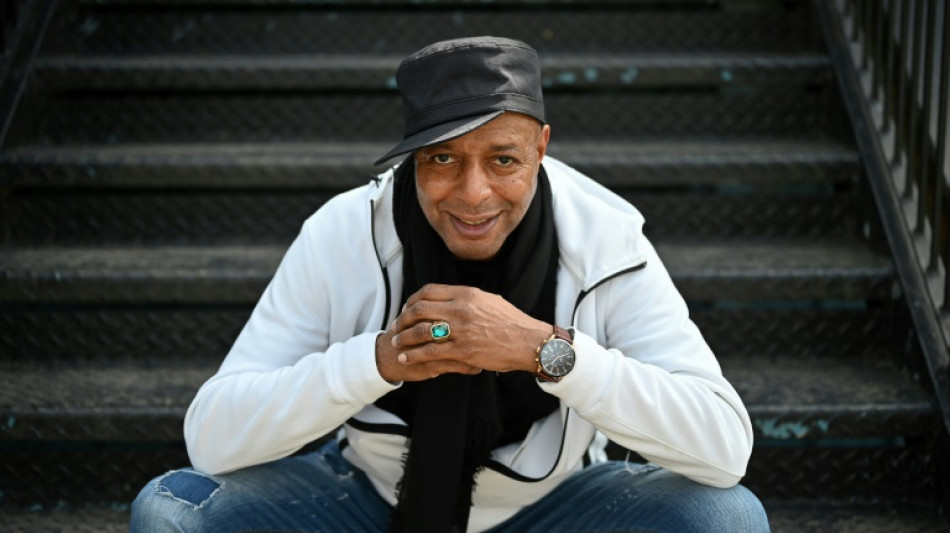
| RIO | -1.53% | 62.03 | $ | |
| BTI | 1.01% | 37.71 | $ | |
| CMSC | -0.65% | 24.57 | $ | |
| SCS | -1.33% | 13.54 | $ | |
| NGG | -0.68% | 62.83 | $ | |
| BP | -1.24% | 28.96 | $ | |
| CMSD | -0.61% | 24.43 | $ | |
| RBGPF | 100% | 60.1 | $ | |
| BCC | -2.76% | 148.41 | $ | |
| BCE | -1.46% | 26.63 | $ | |
| GSK | -0.38% | 34.02 | $ | |
| RYCEF | -0.29% | 6.78 | $ | |
| RELX | 0.51% | 46.81 | $ | |
| VOD | -0.56% | 8.86 | $ | |
| JRI | -0.98% | 13.24 | $ | |
| AZN | -0.06% | 66.36 | $ |

Imagination's Leee John: shining a light on UK black music
Young people of colour in the UK don't know enough about the history of British black music, according to Leee John, the former lead singer of 1980s soul funk group Imagination.
The band struck it big in the early 1980s with hits such as "Body Talk" and "Just an Illusion", going on to sell 30 million albums worldwide.
Now, three decades after Imagination was part of a wave of new black artists, John says he is on a journey to "uplift and bring a positive message" to young black people beset by negative headlines about everything from the economy to stabbings and gangs.
The singer, now 65, has spent the past 10 years working on a history of British black music which he describes as his "life's passion" and believes can offer young people knowledge to help unlock their potential.
"I think the issue with black music is that a lot of the kids don't even know who, how, what or where things came from," he told AFP.
"They feel like things may have started from the 90s and that's it!"
John's soon-to-be completed Flashback documentary project includes 400 hours of film edited into chapters going right back through the decades to the turn of last century.
It features over 100 interviews with a "kaleidoscope" of musicians, artists and others who have shaped black music in the UK.
They include Jaki Graham, Labi Siffre, Billy Ocean and Patti Boulaye as well as Pauline Black of The Selecter, Neville Staple of The Specials and Maizie Williams of Boney M.
- 'Our time' -
John, who grew up in London and briefly in New York during the 1960s and 70s in a family of St Lucian descent, says he was he was struck by the number of black British artists coming up after he returned from the United States.
"I thought, 'Wow this is really interesting. So we can do it here too'," he said.
Signed by a record company at the age of 15, he failed to score the hit record he wanted -- something he describes as a painful experience that eventually made him "stronger".
"That taught me a great deal and I had to learn my trade. I had to learn the industry and doing that made me stronger, wiser and more educated in the music scene and in how to survive," he said.
John's initial focus for the Flashback project was the late 1970s and 1980s, when he says there were many changes that "really changed the pathway for British black music on a global level".
"I felt there was an organic-ness that we all had but what we didn't have is support in distribution and marketing."
As the new wave of black artists such as Sade, Trevor Walters, Maxi Priest and The Cool Notes started to make an impact, he says, record companies started to take note of the international interest they were generating and finally decided to invest in them.
"I think basically we found that we could do our own thing. We emulated the Americans but I felt that we found our voice.
"We'd studied, we'd learned and it was our time to create our own," he said.
- 'Positive message' -
Imagination, a three-piece that also included Ashley Ingram and Errol Kennedy, had hits in 28 countries garnering them four platinum discs and nine gold discs.
Ingram and Kennedy left the band in 1987 and John and a new line-up continued until 1992 when they split.
John, also an ambassador for the SOS Children Village charity, has continued to perform both internationally and in the UK.
As some of those he interviewed for the project have since died, he said he was pleased to be able to help ensure their legacies.
"I think it's taken for granted (but) you wouldn't have half the artists doing what they do now if it wasn't for these other artists," he said.
"I think music is a universal language. That's why they (young people) need to learn a little about Flashback and about the history of British black music.
"I think the more they learn about that, it will give them the incentive to understand what was, what is and what can still be," he said.
"That's my journey in life right now -- to uplift and bring a positive message to the youth."
X.Fitzpatrick--NG



